10 Best AI-Powered Brand Sentiment Analysis Tools to Transform CX in 2025
Explore the top AI-powered sentiment analysis tools of 2025 that enhance customer experience by analyzing real-time feedback from various channels.

AI-powered sentiment analysis tools help businesses understand customer emotions in real time. These tools analyze feedback from social media, surveys, support tickets, and more to identify trends, predict issues, and improve customer satisfaction. Here are 10 top tools leading the way in 2025:
- BuildBetter: Processes multi-channel data for real-time insights and strategic feedback analysis.
- Talkwalker: Analyzes sentiment in 127 languages with predictive analytics and crisis prevention.
- Sprout Social: Uses social data to track trends and improve customer interactions.
- Brandwatch: Offers advanced social listening and AI tools like React Score and Iris AI.
- Lexalytics: Provides industry-specific sentiment analysis with multilingual support.
- Medallia: Real-time text analytics with tools for ticket prioritization and multilingual feedback.
- Qualtrics: Processes multi-channel feedback with digital experience analytics.
- MonkeyLearn: Integrates with existing tools for easy feedback analysis.
- NetBase Quid: Pulls in 250M+ posts daily for deep sentiment insights.
- IBM Watson NLU: Customizable AI for multi-channel sentiment analysis with high accuracy.
Quick Comparison
| Tool | Key Features | Best For |
|---|---|---|
| BuildBetter | Multi-channel insights, real-time analysis | B2B teams |
| Talkwalker | Multilingual, crisis prevention | Global brands |
| Sprout Social | Social media focus, trend tracking | Social media-heavy brands |
| Brandwatch | AI-driven social listening | Competitive intelligence |
| Lexalytics | Industry-specific, multilingual | Hospitality, retail |
| Medallia | Real-time analytics, ticket sorting | Large enterprises |
| Qualtrics | Digital experience analytics | Enterprise CX improvement |
| MonkeyLearn | Easy integrations, feedback tagging | Small to medium businesses |
| NetBase Quid | Large-scale data processing | Data-heavy industries |
| IBM Watson NLU | High accuracy, customizable models | Enterprise-level needs |
These tools help businesses stay proactive, address customer concerns, and enhance CX with actionable insights. Choose the one that aligns with your goals and start transforming your customer experience today.
Monitoring Brand Sentiment with AI | Exclusive Lesson
1. BuildBetter
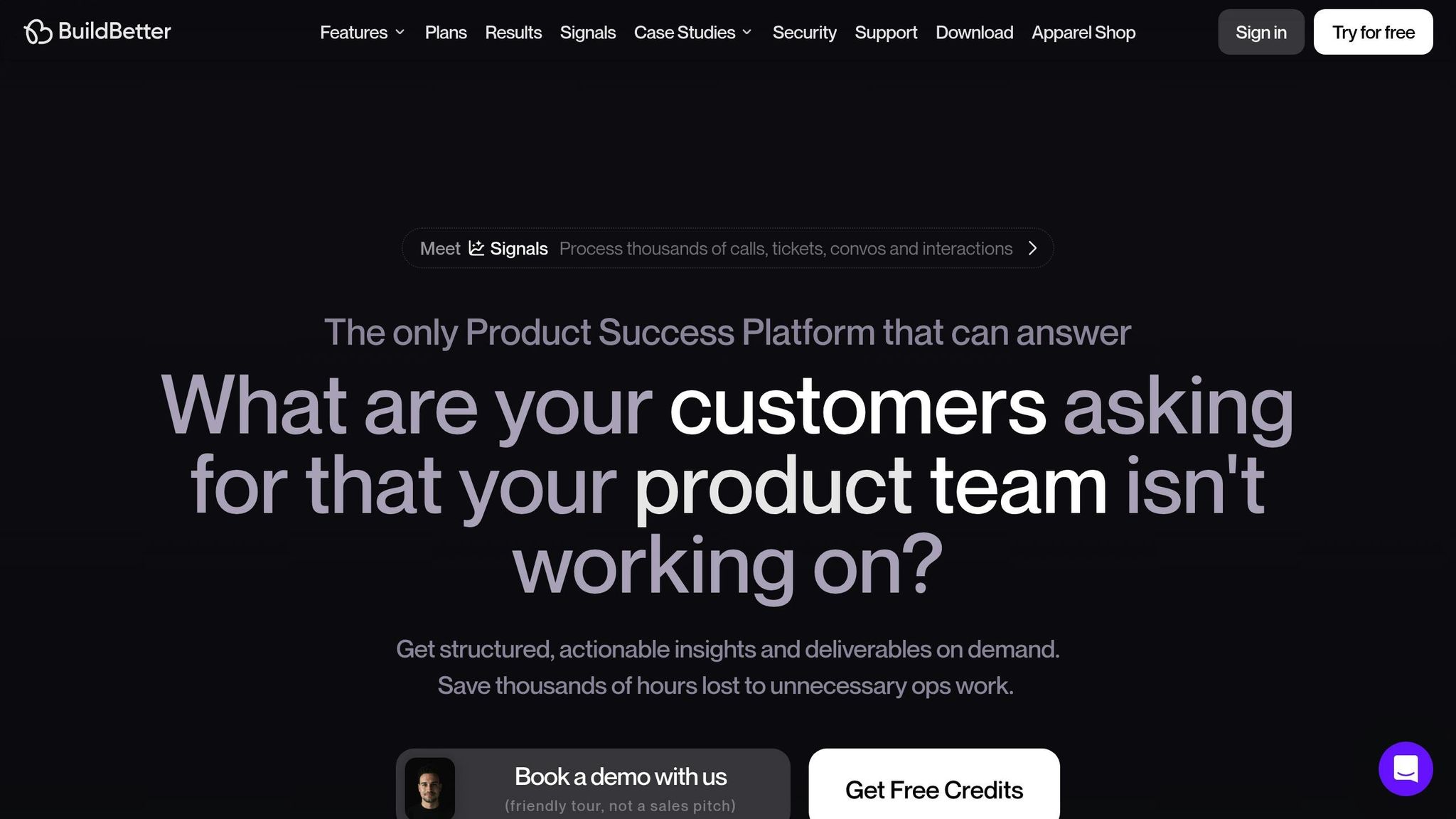
BuildBetter is designed to help B2B teams improve customer experience (CX) by using insights based on data. Its AI engine processes multiple data sources at once, analyzing information from support tickets, surveys, internal chats, and sales calls to give a complete picture of customer sentiment.
The platform's AI focuses on three main areas:
- Real-time Sentiment Processing: Speeds up response times - up to 10x faster than older methods - by automatically categorizing feedback based on severity and frequency, helping teams address issues efficiently.
- Intelligent Pattern Recognition: Spots recurring themes by identifying common feature requests and pain points, ranking them by how often they occur and their impact.
- Strategic Insight Generation: Links customer feedback to business results by analyzing sales demo transcripts. This helps teams identify which features resonate most with prospects and refine strategies accordingly.
BuildBetter connects with over 100 widely used tools like Zoom, Slack, Jira, and Salesforce. By pulling sentiment data from various sources, it turns scattered, unstructured information into clear, actionable insights that can improve products and customer interactions.
2. Talkwalker
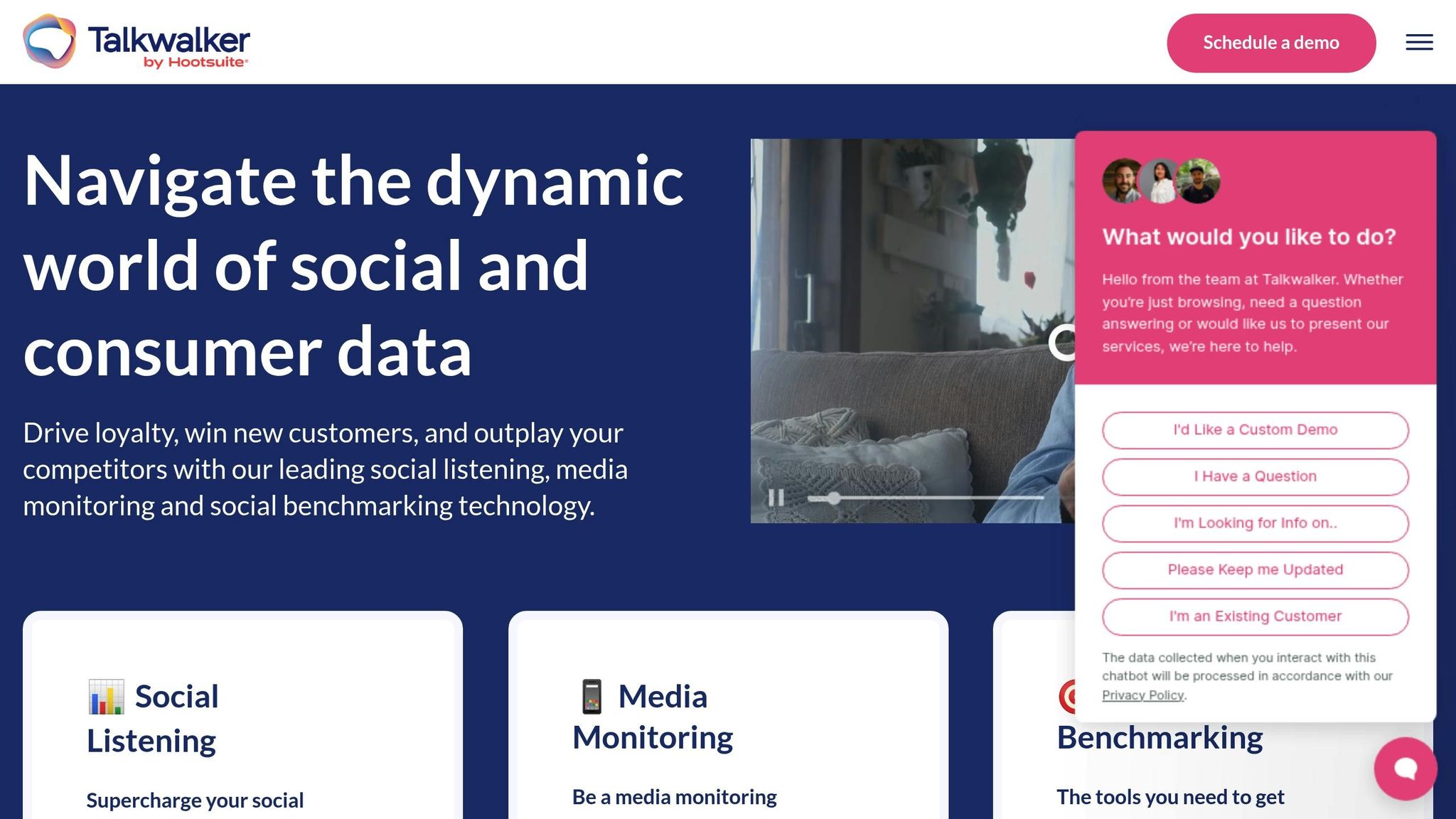
Talkwalker’s Blue Silk™ AI processes customer feedback from various channels and deciphers subtle details in 127 languages with an impressive 90% accuracy. This capability supports real-time crisis management, tailored product insights, and effective campaign tracking.
The platform helps brands address potential issues before they escalate. For instance, during the 2022 chili pepper shortage at Huy Fong, analysis of 4,200 mentions revealed that 80.9% of negative sentiment reflected sadness rather than anger.
Talkwalker’s AI also examines product feedback to guide development strategies. For example, Merck KGaA discovered that customers valued resolution and brightness more than contrast in smartphone displays.
In May 2021, during LEGO’s "Everyone is Awesome" campaign, the platform analyzed 41,000 social interactions, finding 64% of the sentiment was positive.
Key Features:
- Automated Sentiment Scoring: Measures customer satisfaction (CSAT) effectively.
- Multi-channel Monitoring: Tracks sentiment across social platforms and review sites.
- Predictive Analytics: Detects triggers for customer churn.
- Crisis Prevention: Identifies negative trends for immediate action.
"At Talkwalker, we understand that being able to accurately classify sentiment is essential. Brands need to be able to benchmark brand health indicators, supplement the data with demographic information, and combine product features to give consumers what they want."
3. Sprout Social
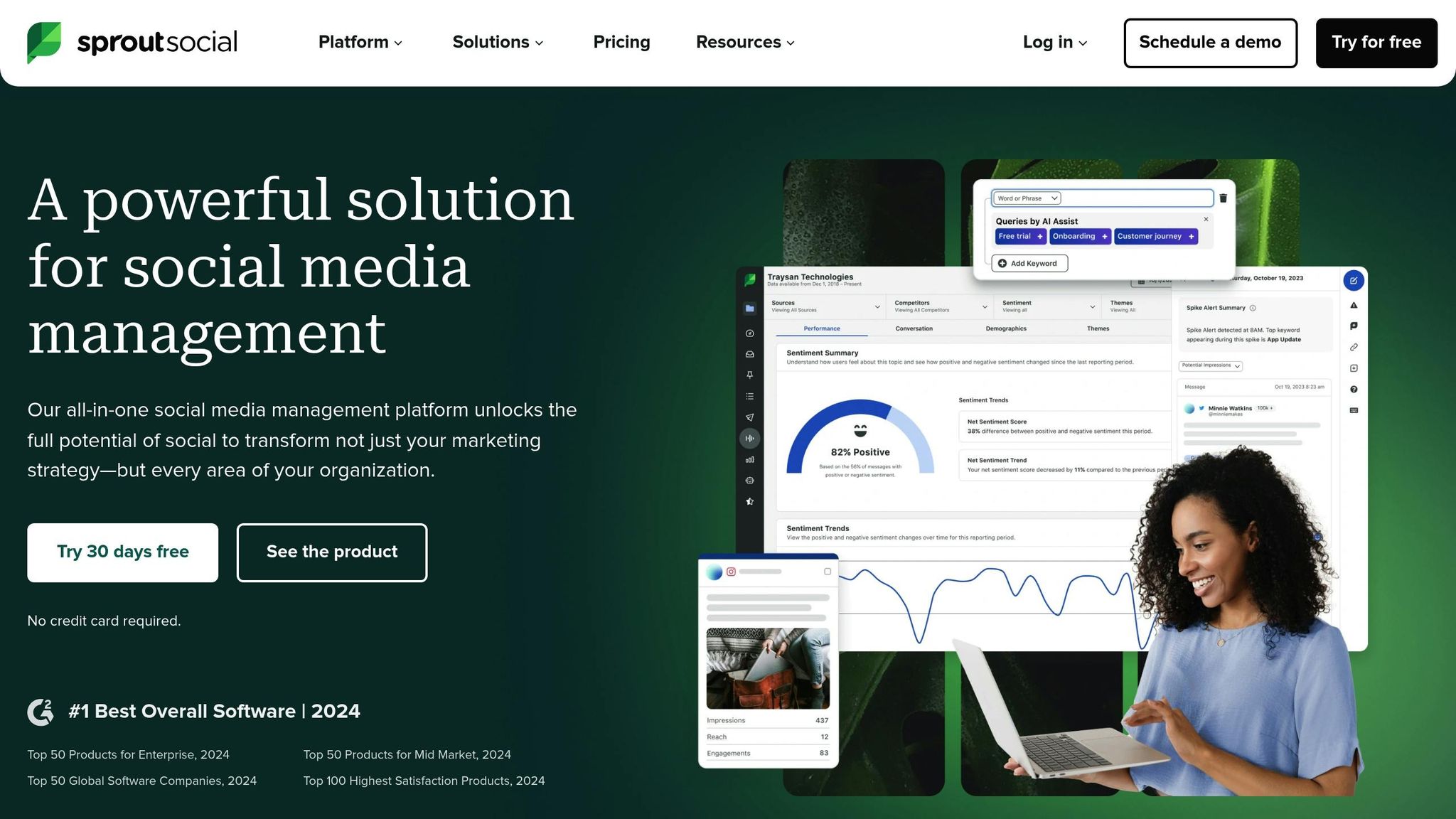
Sprout Social uses over ten years of social data and advanced neural networks to analyze social messages, categorizing them as positive, negative, neutral, or unclassified.
Success Stories
The Atlanta Hawks NBA team saw video views jump by 127.1% and their Facebook audience grow by 170.1% in just three months using Sprout Social. Similarly, James Hardie® improved brand health by sharing sentiment insights with their sales and product teams to drive meaningful changes.
These examples highlight the platform’s strong analytical tools.
Features That Stand Out
Sprout Social provides tools designed to turn data into actionable insights.
Smart Inbox and Reviews Integration
The platform gathers sentiment data from social networks like X, Facebook, and Instagram, as well as review sites including Google My Business, Yelp, Tripadvisor, and Glassdoor.
Core Analysis Tools
- Automated scoring with the option for manual adjustments
- Thematic analysis to uncover product insights
- Tagging features to spot trends
"Sentiment analysis has been helpful as far as trying to understand how people are reacting to us and our artists. It's also extremely helpful to have a listening tool where we can flag certain conversations internally and amongst the team, including conversations that could be delicate."
– Matt Brum, Director of Digital Strategy and Social Media, BMLG
For instance, a food and beverage company used Sprout's Social Listening feature to refine their product line. They discovered that chocolate-based varieties received much more positive feedback, leading to R&D adjustments.
Sprout Social helps brands:
- Track brand health across platforms
- Address customer concerns before they escalate
- Connect sentiment data to ROI
- Improve customer service responses
These tools allow companies to refine strategies and enhance customer experiences in today’s fast-changing digital world.
4. Brandwatch
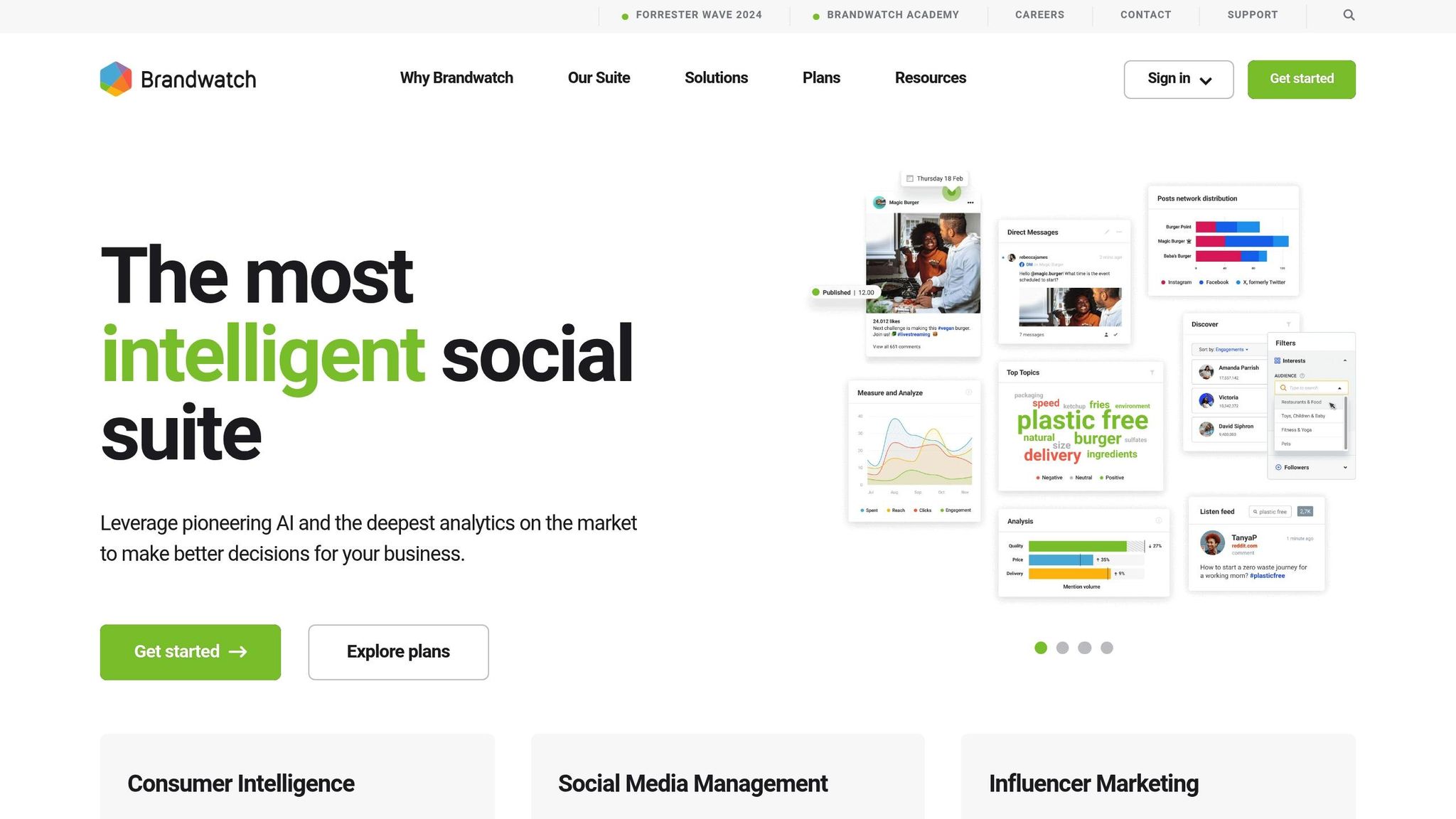
Brandwatch, used by two-thirds of Forbes 100 brands, offers AI-driven sentiment insights through advanced social listening. Its capabilities are built on three interconnected AI tools:
Core AI Technologies
- React Score: Processes conversations from over 100 million sources using NLP to spot risks and opportunities.
- Iris AI: A generative assistant that crafts queries and summarizes competitor content.
- AI Search and Topics: Employs GPT to grasp context and identify emerging trends.
Real-World Impact
These tools deliver measurable customer experience (CX) improvements across industries:
Metia's Marketing Boost
Metia achieved significant gains in key marketing metrics with Brandwatch's insights.
Bimbo's Crisis Turnaround
Bimbo transformed a crisis into a profitable opportunity, driving $580,000 in sales through a strategic social campaign powered by Brandwatch.
Platform Strengths
Brandwatch stands out in areas like real-time monitoring, sentiment analysis, competitive intelligence, trend detection, and customizable reporting dashboards.
"Brandwatch built this game-changing hybrid approach, combining generative and proprietary AI with human oversight to deliver accurate, reliable insights that help our customers confidently navigate the complexities of the digital landscape."
With its hybrid model blending generative AI and human expertise, Brandwatch provides accurate insights that enable brands to fine-tune CX strategies effectively.
5. Lexalytics
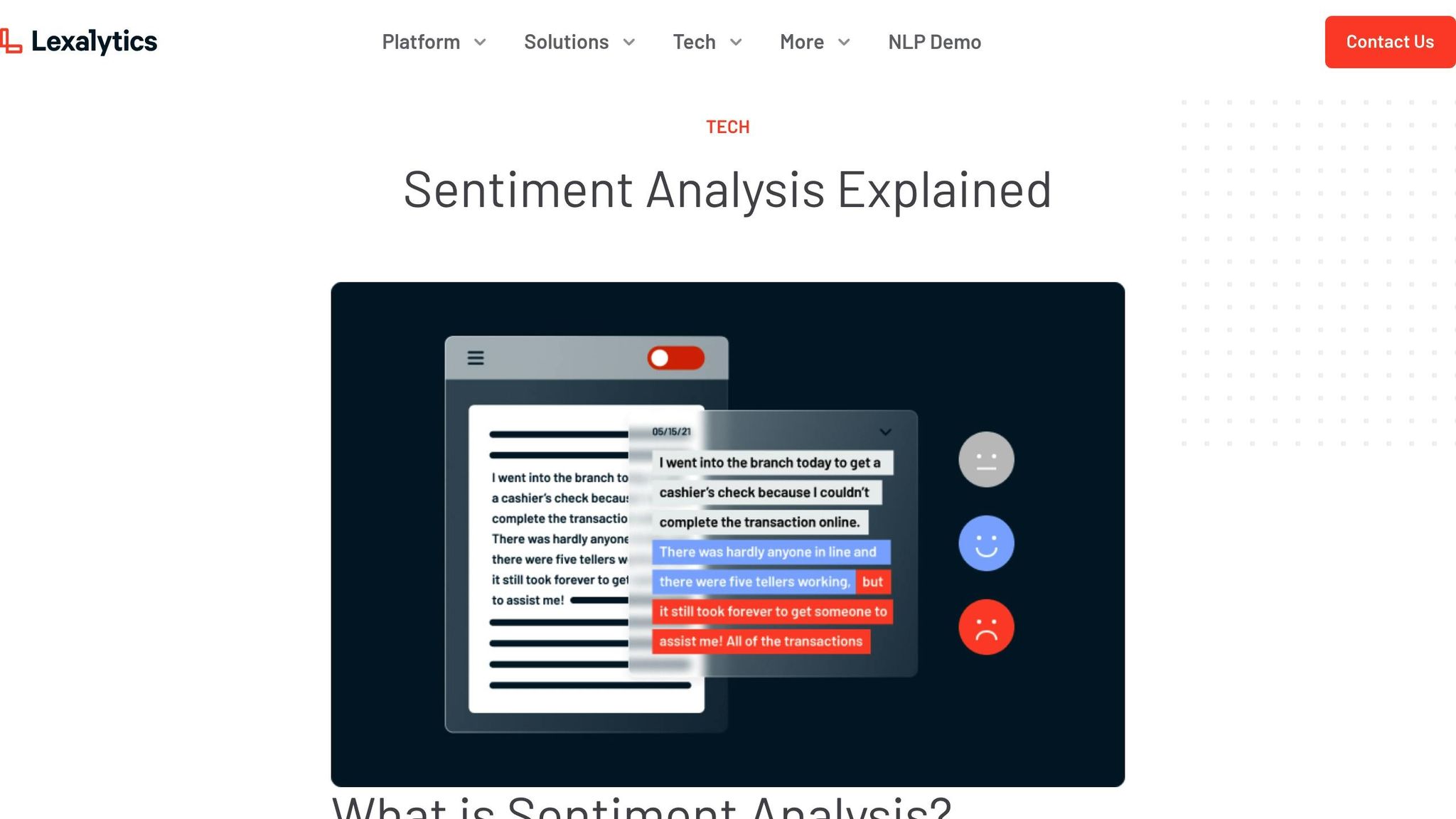
Lexalytics specializes in sentiment analysis, processing customer feedback in 29 languages and reaching 67% of the global population. Its NLP engine provides insights that businesses can use, available through on-premise, private cloud, or hybrid setups.
Key AI Features
Lexalytics relies on several core technologies, including:
- Sentiment Analysis: Detects emotional tone and intensity in feedback.
- Entity Extraction: Identifies and categorizes mentions of products, services, and brands.
- Intention Detection: Predicts customer behavior and likelihood to purchase.
- Smart Categorization: Sorts feedback into relevant business categories.
These tools are designed to meet the needs of various industries.
Industry-Specific Tools
Lexalytics offers customized solutions for sectors like hospitality, restaurants, and retail. These include tailored terminology to improve sentiment analysis accuracy.
Practical Use Case
In the hospitality industry, Best Western used Lexalytics' Spotlight platform to analyze guest feedback. This helped them identify and address recurring issues like air conditioner failures and bathroom fixture problems.
Customization Options
Lexalytics allows users to configure the platform to their needs. Businesses can define custom entities, query topics, and taxonomies, making it easier to organize and analyze feedback across different languages and channels. This adaptability helps companies integrate sentiment analysis into their customer experience strategies effectively.
6. Medallia

Medallia offers an AI-driven platform designed to measure and improve customer experiences using real-time data and insights from various customer channels.
At the core of Medallia is the Athena AI engine, which uses advanced Natural Language Understanding (NLU) to analyze customer feedback in real time. It identifies themes, intent, emotions, and sentiment across multiple languages, enabling businesses to automate routine tasks and gain a deeper understanding of customer experiences.
Key Features
Medallia stands out with several powerful tools:
- Real-Time Text Analytics: Spots trends and opportunities automatically, helping businesses address customer needs promptly.
- Custom Topic Modeling: A low-code setup allows users to create specialized topic models easily.
- Automated Ticket Prioritization: AI-powered sorting prioritizes support tickets by urgency and sentiment.
- Multilingual Analysis: Accurately processes feedback in multiple languages.
These tools help businesses achieve measurable improvements in customer experience.
Proven Results
Medallia has delivered impressive outcomes for its users:
- A 185% ROI over three years.
- A 30% boost in average customer spending.
- $39.25M in additional revenue generated.
These results highlight the platform’s impact on business performance.
Real-World Success Story
Madison Square Garden (MSG) serves as a strong example of Medallia’s effectiveness. Within a week of adopting the platform, MSG made significant improvements based on actionable insights:
"The program led to better overall guest experiences and improvements in entry, concessions, merchandise, staff training, and show operations. Event entry scores increased by 16 points, and overall satisfaction increased by 16%."
Industry Recognition
Medallia has been recognized as a leader in several industry evaluations:
- Forrester Wave™ Customer Feedback Management (Q4 2025)
- Text Mining and Analytics Platforms (Q2 2025)
- IDC Voice of the Customer MarketScape
- 2025 Gartner® Magic Quadrant™ for Voice of the Customer Platforms
7. Qualtrics
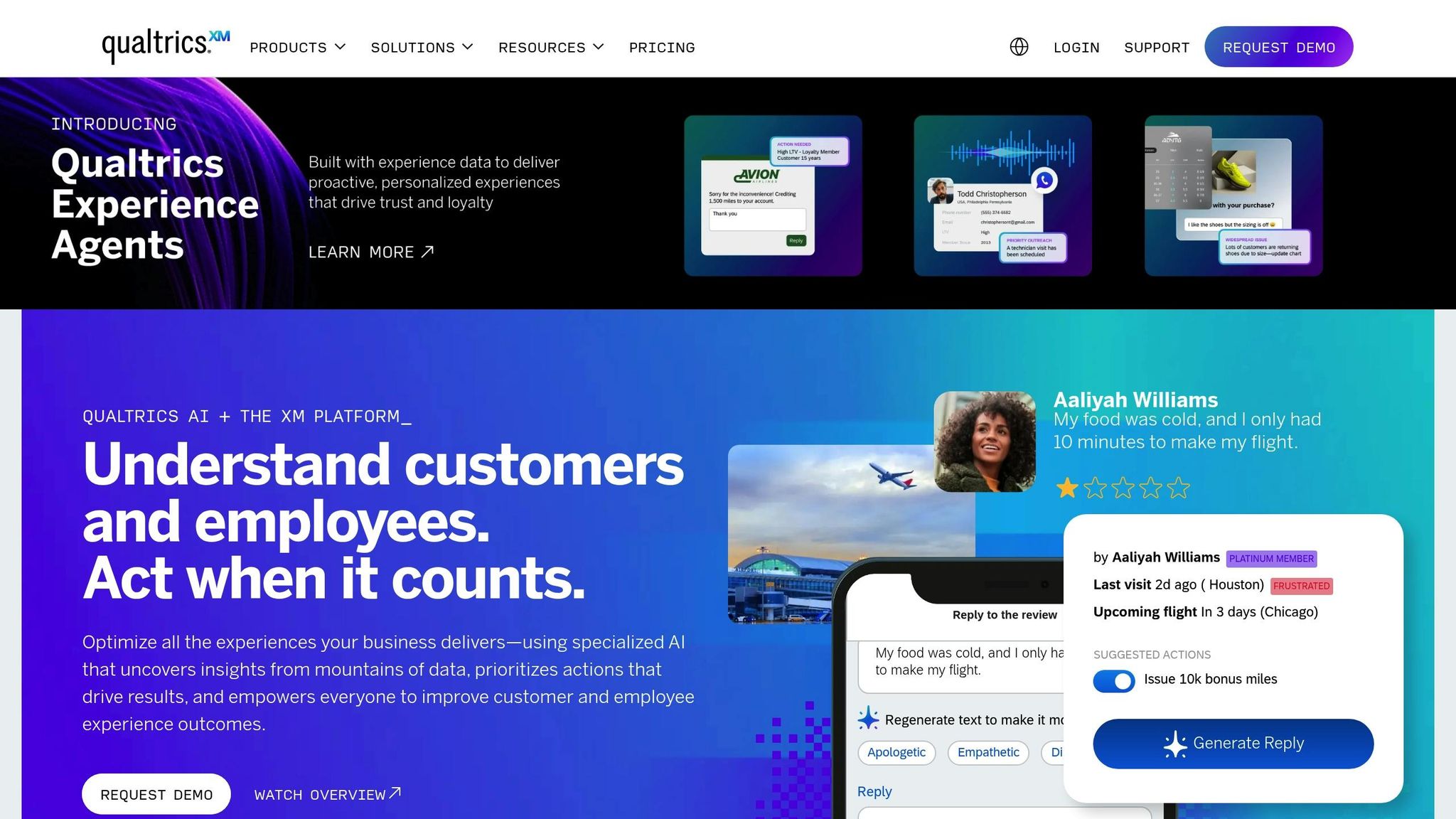
Qualtrics has invested $500 million into AI technology, positioning itself as a leader in sentiment analysis. The platform turns customer feedback into actionable steps, aligning with the growing demand for AI-driven customer experience (CX) solutions.
Core AI Capabilities
Qualtrics' AI engine processes feedback from multiple channels, including voice, chat, social media, surveys, in-app interactions, and emails. It assigns sentiment ratings such as Very Negative, Negative, Neutral, Positive, Very Positive, or Mixed.
Standout Features
Digital Experience Analytics delivers real-time insights by automatically detecting frustration, mapping customer journeys, and identifying technical issues.
Customer Care Assist improves support operations by:
- Creating AI-powered support tickets
- Developing coaching plans
- Summarizing calls
- Prioritizing issues based on severity
These features help businesses make meaningful improvements, backed by real-world examples.
Real-World Impact
"The Qualtrics platform allows for quick, scalable analysis that can be easily shared across our organization to make fast decisions and support the intuition that has underpinned our success to date. We can share insights across our ops, finance, culinary, and tech teams to more deeply understand what people love about our food and ensure that our guest experience both in stores and over digital channels like our app and website meets and exceeds their expectations."
- Charles Frankievich, Sr. Director Consumer Insights and Action, Shake Shack
Shake Shack reported a 30% increase in likelihood-to-recommend scores after implementing Qualtrics. This example highlights how the platform can boost customer satisfaction and loyalty.
Business Performance Metrics
| Metric | Impact |
|---|---|
| Brand Switching Risk | 80% of customers change brands after a poor experience |
| Single Interaction Impact | 43% are likely to switch after one bad interaction |
| Review Influence | Over two-thirds of consumers check reviews before making new purchases |
Enterprise Success Story
Hilton uses Qualtrics AI across 7,600 properties worldwide to gather guest feedback, analyze digital interactions, and shape its business strategy. This approach contributed to Hilton’s record-breaking financial performance in 2023.
The platform’s Text iQ model continuously learns from sentiment edits, supports multiple languages, and classifies feedback with precision. This allows organizations to address customer experience challenges effectively and in real time.
8. MonkeyLearn
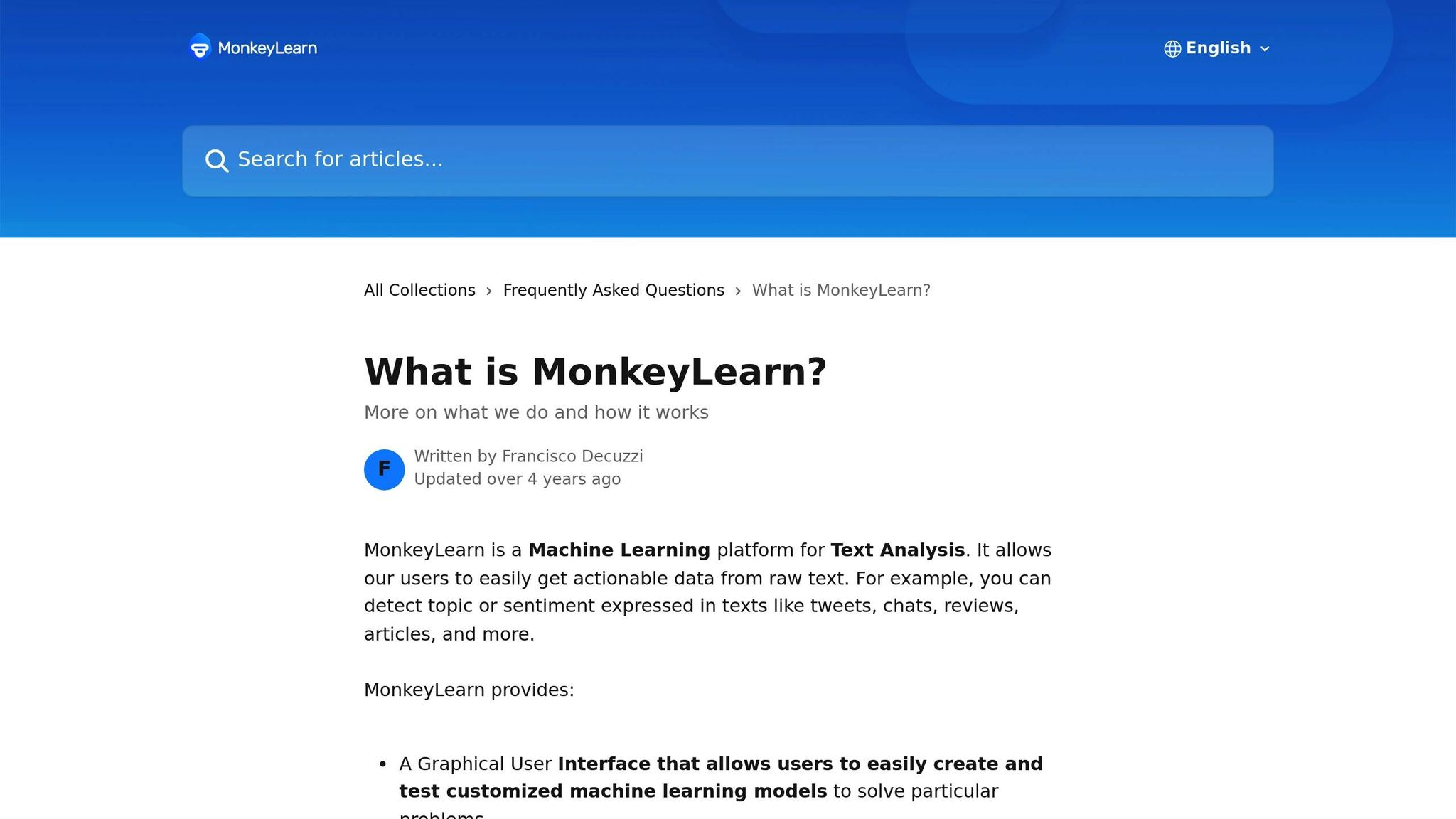
MonkeyLearn is making waves in 2025 with its advanced text analysis and seamless integration options, helping businesses elevate how they manage customer feedback. It processes feedback efficiently by connecting effortlessly with existing tools.
Integration Ecosystem
MonkeyLearn's integration options make it highly adaptable to various business needs:
- Direct connections with popular customer experience platforms.
- Access to over 1,000 web tools through Zapier.
- Flexible API options for custom setups.
- Built-in compatibility with customer support platforms.
These integrations simplify technical setup, making it easier to incorporate MonkeyLearn into existing workflows.
Technical Implementation
MonkeyLearn transforms raw customer feedback into meaningful insights. Alonso Cienci, a Software Engineer at I2S Business Solutions, highlights: "It offers many third-party integrations, it is complemented by Excel".
Practical Applications
Somiya Gupta, Director of Social Media Marketing at Rckcofficial, shares her experience:
"MonkeyLearn allows me to turn my ticket data into tags for Zendesk, enabling better customer connections. The user was also able to upload CSVs and connect with apps via direct integrations, Zapier, or API to find trends in user feedback".
Integration Options
| Integration Type | Key Features | Business Benefits |
|---|---|---|
| Direct Integration | Works natively with Typeform, Front, Zendesk | Instant data synchronization |
| Zapier Connection | Links to over 1,000 web tools | Automates workflows |
| API Implementation | Supports custom integrations | Flexible deployment options |
This integration network allows businesses to tailor MonkeyLearn to their specific needs. By streamlining data flow and connecting feedback channels to operational tools, MonkeyLearn simplifies the process of turning customer sentiment into actionable insights.
9. NetBase Quid
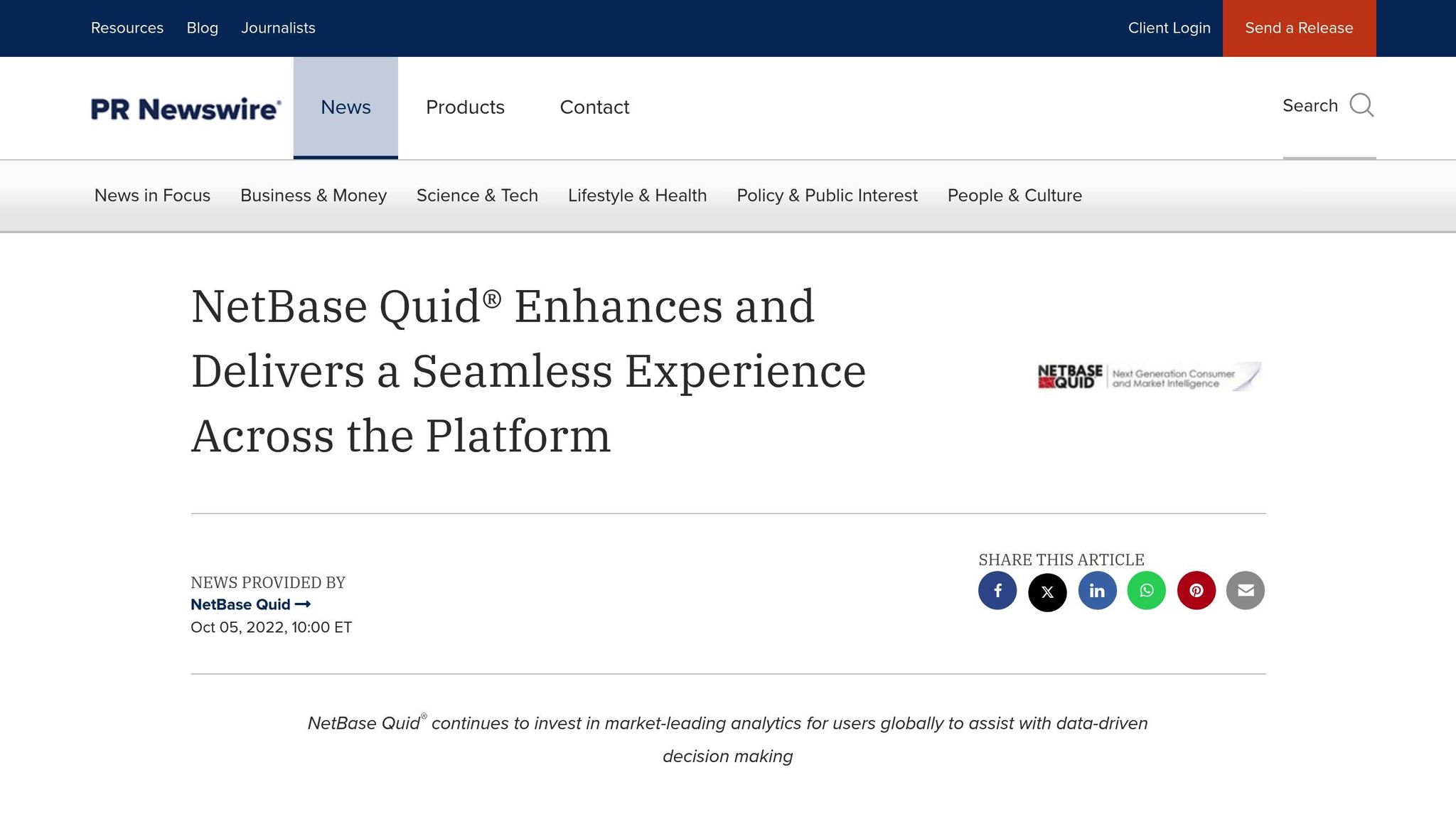
NetBase Quid is making waves in 2025 with its powerful data processing and AI-driven insights. The platform pulls in over 250 million posts daily from major social platforms, providing businesses with deep brand sentiment analysis. Let’s dive into its data handling capabilities, analytical tools, real-world applications, and enterprise integration features.
Data Processing Capabilities
NetBase Quid processes an impressive range of data types every day:
| Data Source | Daily Volume | Coverage |
|---|---|---|
| Social Posts | 200M+ | Major social platforms |
| Blog Posts | Millions | 2M+ blogs in 160+ languages |
| Forum Posts | 17M+ | 10,000+ forums |
| News Articles | Millions | 580,000+ sources |
| Reviews | Billions | 85+ review sites |
AI-Powered Analysis Tools
The platform’s tools turn massive amounts of raw data into meaningful insights. Quid Compete evaluates brand performance, Quid Connect unifies sentiment across channels, Quid Monitor tracks brand health in real time, and Quid Predict identifies emerging trends.
At the heart of this system is the AI agent, Q, which uses custom-built models to provide context-rich insights. These insights can be seamlessly integrated into existing business tools, making decision-making faster and more informed.
Real-World Impact
Here’s what users are saying about NetBase Quid:
"Thanks to Quid, our team capitalizes on new trends, improving sell-through rates by 25% and reducing stockouts. It's a game-changer." - Chief Merchandising Officer
"Quid helps us stay ahead of potential crises, giving us real-time insights and context we never had before. This proactive approach has improved our brand perception by 30% and strengthened customer trust." - SVP of Brand Strategy at Top Consumer Brand
These examples highlight how the platform drives measurable improvements in business performance and customer engagement.
Enterprise Integration
NetBase Quid integrates effortlessly with various systems, including merchandising platforms, product catalogs, demand planning tools, campaign management software, site search optimization, and A/B testing frameworks. With over 2 petabytes of model data in active use, it equips businesses to respond to customer sentiment in real time.
10. IBM Watson Natural Language Understanding
IBM Watson's Natural Language Understanding (NLU) improves customer experiences by analyzing feedback from various channels to provide actionable insights. It offers advanced analytics and customization options for thorough sentiment evaluation.
Core Capabilities
Watson NLU combines IBM Research algorithms with open-source technologies to deliver detailed text analysis:
| Analysis Type | Features | Accuracy/Performance |
|---|---|---|
| Sentiment Analysis | Evaluates sentiment at document, sentence, and aspect levels | Up to 96% accuracy with custom training |
| Text Classification | Organizes customer complaints, reviews, and feedback | Supports multiple categories |
| Emotion Detection | Identifies emotions like joy, sadness, anger, fear, and disgust | Processes in real time |
| Topic Modeling | Extracts and categorizes themes automatically | Works across multiple channels |
Industry Applications
In the banking sector, it helps route customer complaints efficiently. In hospitality, it analyzes guest reviews to uncover actionable insights.
Advanced Features
The platform's containerized design allows for smooth integration into enterprise systems. Key features include:
- Custom Model Training: Tailor models to specific industry terminology.
- Multi-Channel Analysis: Process feedback from social media, email, and support channels seamlessly.
- Real-Time Processing: Generate instant insights for quick decision-making.
Real-World Impact
NatWest Group improved its mortgage application process using IBM Watson, showcasing its ability to enhance customer experiences in financial services.
"Sentiment analysis in customer experience refers to the data analysis process of understanding and measuring how a customer feels about a particular product, service or brand."
– Teaganne Finn, Content Writer, IBM Consulting
Performance Metrics
The platform stands out with its accuracy rates. Custom-trained sentiment analysis models reach 96% accuracy, compared to the 87% typical of standard solutions. This improved precision helps businesses better understand customer emotions and make targeted service improvements.
How to Select a Sentiment Analysis Tool
Choosing the right sentiment analysis tool means looking closely at its accuracy and the quality of its training data. Here’s how to evaluate key aspects to make an informed decision.
Accuracy Matters
The accuracy of a tool is a critical factor. Studies show that human analysts tend to agree on sentiment about 80–85% of the time. Use this as a benchmark when evaluating tools:
| Accuracy Level | Type of Model | Best Use Case |
|---|---|---|
| 70.5% | Basic models | General content analysis |
| 81.5% | Standard models | Multi-channel feedback |
| 85%+ | Domain-specific models | Industry-focused analysis |
Focus on Data Quality and Training
The performance of sentiment analysis tools heavily depends on the quality of their training data and how well they’re tailored to specific needs.
-
Industry-Specific Training
Look for tools trained on content relevant to your field. Models built with industry-specific data often deliver better results than general-purpose ones. -
Testing the Model
Evaluate tools by splitting data into training and test sets. Use domain-relevant content during training and compare how different scoring methods perform. This ensures the tool aligns with your specific requirements.
Conclusion
By 2025, AI-driven sentiment analysis is set to revolutionize how businesses interact with their customers. This technology has introduced capabilities that are reshaping the way companies connect with their audiences:
| Feature | Effect on Customer Experience |
|---|---|
| Emotion Detection | Pinpoints subtle emotional cues for tailored responses |
| Predictive Analytics | Anticipates issues and addresses them using past data |
| Cross-Channel Integration | Offers a unified view of sentiment across all customer interactions |
These tools are changing the game for customer experience. As Mikhail Dubov explains, "A modern sentiment analysis tool transforms raw feedback, like reviews, social media mentions, and survey responses, into actionable insights, helping companies shape positive perceptions and drive engagement in a competitive market."
Looking ahead, businesses can expect even more from these tools, including:
- Real-time emotion tracking for instant, context-sensitive responses
- Better integration across multiple customer interaction points
- Enhanced accuracy in predicting customer needs and potential challenges
The tools reviewed highlight how these advancements are leading to more responsive and customized customer interactions. Success lies in selecting solutions that align with business goals and can scale as demands grow. As companies continue to focus on customer experience, AI-powered tools will play a key role in building deeper and more meaningful customer relationships.
"2025 will see generative AI (GenAI) go from being a buzzword to delivering tangible competitive advantages." - Foundever
This shift moves businesses beyond basic feedback collection, introducing real-time emotional intelligence that transforms customer understanding and service.